Top 7 Kevel Alternatives & Competitors in 2025
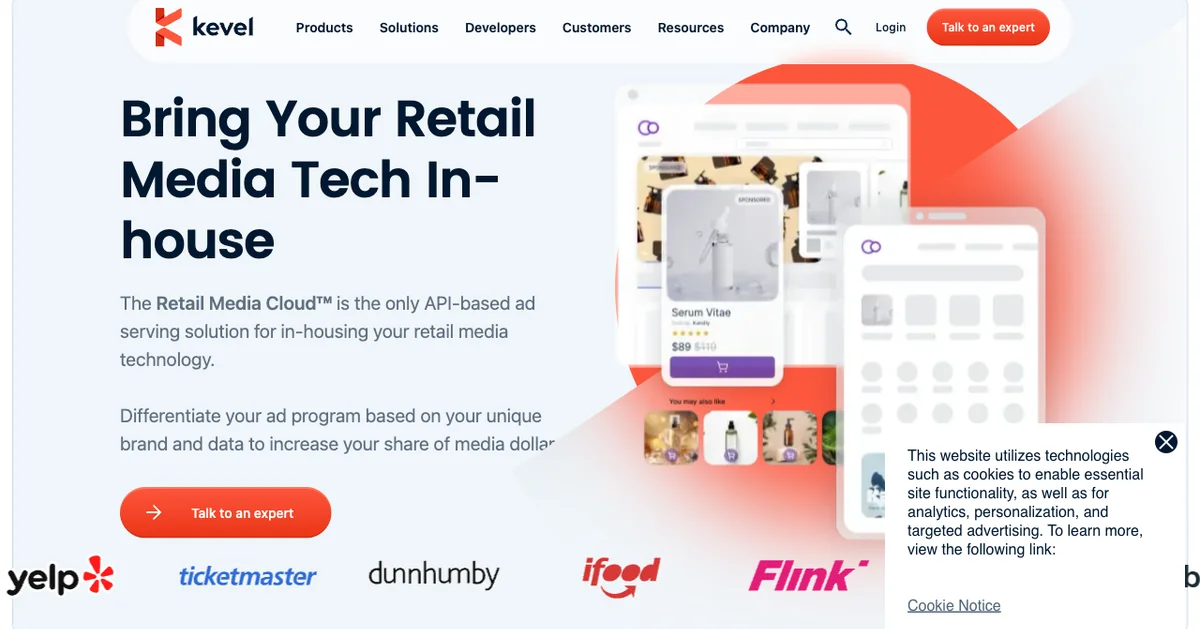
Kevel is shaking up the retail media landscape with its Retail Media Cloud, a solution designed for retailers and marketplaces. By allowing brands to bring their advertising in-house, Kevel empowers businesses to tailor their ad programs using their data. This customization helps retailers gain a larger share of media dollars without compromising their control or visibility into their advertising ecosystem.
The Retail Media Cloud is built on a flexible API-based infrastructure, making it easy to integrate and manage campaigns across digital platforms. Retailers can use the Kevel Ad Server for everything from ad decisioning to reporting. They have the ability to harness their first-party data for audience segmentation and ad personalization. As the retail media sector continues to grow, Kevel stands out as a practical option for businesses eager to enhance their advertising efforts while maintaining autonomy over their data and strategies.
While kevel is a great product, it’s always good to shop around and look for alternatives. This article identifies some top competitors and their pros and cons.
Table of Contents
PromoteIQ
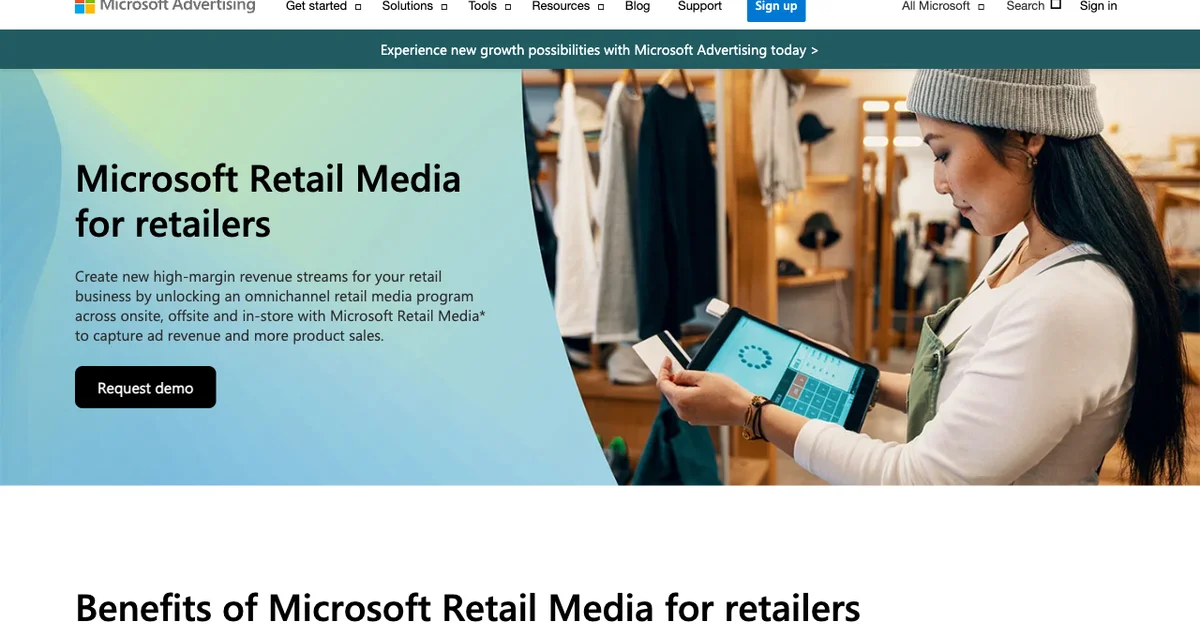
PromoteIQ is an alternative in the Retail Media Technology landscape, providing retailers with ways to generate revenue. Part of Microsoft’s tools, PromoteIQ helps retailers set up retail media programs across their websites, apps, and even physical stores.
PromoteIQ’s integration with Microsoft’s technologies is key. Retailers can use AI and data analytics to create custom ad solutions. This allows quick adaptations to industry changes and consumer behaviors, positioning PromoteIQ as a flexible solution in a fast-paced market.
Their offerings include onsite advertising, where product ads blend into a retailer’s website. This maximizes visibility for high-intent shoppers. Offsite advertising lets retailers draw back customers using their own first-party data across social media and other platforms. Advertisers can effectively spend their budgets while benefiting from the retailer’s insights.
PromoteIQ also focuses on in-store capabilities through a pilot program. This initiative aims to drive sales by integrating digital marketing tools in brick-and-mortar settings, reaching shoppers who may be overlooked in a purely online strategy.
By creating a unified platform for both online and offline channels, PromoteIQ allows businesses to capture additional ad revenue while maintaining a positive shopping experience. Seamless reporting tools provide insights that directly link advertising efforts to sales, enabling retailers to refine their strategies.
Pros
-
Integration with Microsoft technologies
-
Customizable ad solutions for diverse retailer needs
-
Comprehensive omnichannel approach: online, offline, in-store
-
Strong analytics for optimizing campaigns
Cons
-
Dependency on Microsoft’s ecosystem may limit flexibility for some
-
Initial setup can require a significant investment of time and effort
CitrusAd
CitrusAd is carving its niche in the retail media tech space, offering solutions for retailers. They’ve built a platform that supports over half of the top 20 retailers globally—more than $2 trillion in annual online sales. What sets CitrusAd apart from others like Kevel?
One standout feature is their self-serve capabilities, allowing retailers to place ads within hours. This means brands control how and when their ads appear, making the process efficient and user-friendly. CitrusAd also offers personalized and native ads that enhance the shopper experience while maintaining brand integrity.
CitrusAd is committed to transparency. Their real-time reporting dashboard gives retailers a view of their performance metrics, allowing for data-driven decisions. First-party data ensures that ads are relevant and targeted, which is crucial in today’s competitive environment.
With branded landing pages, retailers can create their own promotional spaces which enrich their platform and streamline the approval process. They also offer options for email placements, increasing click-through rates while promoting relevant products directly to customers.
CitrusAd offers a robust, customizable solution for retailers looking to up their e-commerce game. They provide a platform that prioritizes retailer needs, ensuring that brands remain in control while driving profitable outcomes.
Pros
-
Fast and flexible ad placements
-
Self-serve functionality promotes user engagement
-
Transparent real-time reporting
-
Effective use of first-party data for targeting
-
Branded landing pages enhance promotional capabilities
Cons
-
Potential learning curve for new users
-
Limited awareness compared to bigger brands
-
May require integration efforts with existing systems
Criteo Retail Media
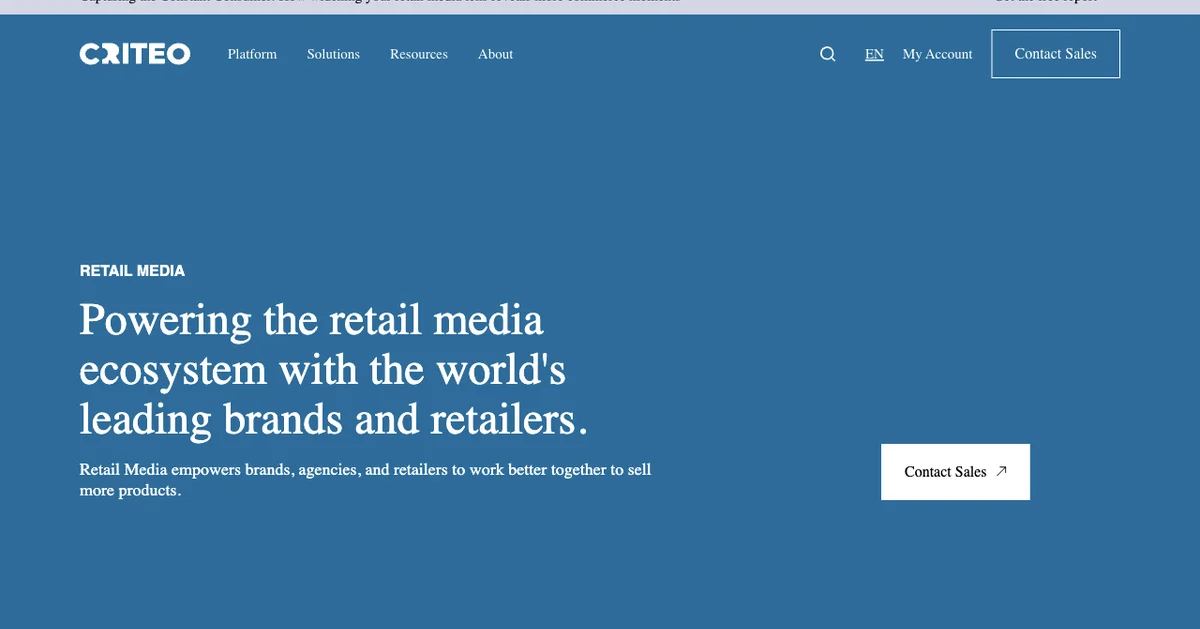
Criteo Retail Media is reshaping e-commerce advertising, offering a platform that facilitates collaboration between brands, agencies, and retailers. Criteo stands out for its ability to create relevant advertising experiences right where sales happen—on retailer and marketplace websites. This placement helps brands improve their visibility on the digital shelf and drives sales for retailers by providing them with a new revenue stream.
Criteo’s platform is based on the idea that meaningful partnerships can lead to shared success. It provides brands with the tools to target and measure their campaigns effectively while using first-party data—notably useful in a world increasingly concerned about third-party cookies. This focus on direct consumer relationships allows brands to adapt their strategies quickly in response to shopper behavior.
One aspect that differentiates Criteo from others is its robust and adaptable self-service platform. Brands can easily buy and sell media in real-time, while retailers maintain control over pricing and campaign management. With transparent workflows and metrics, everyone can see the value being created. The AI-driven features further enhance the platform’s ability to optimize campaigns in a way that feels organic and relevant to shoppers.
Criteo’s open ecosystem encourages a diverse range of advertisers, ensuring that retailers have access to competitive demand. This positioning enables brands to engage shoppers effectively and empowers retailers to monetize their digital space efficiently.
Pros
-
Intuitive self-service platform for easy ad management
-
Strong focus on first-party data for targeting
-
AI optimization for better performance
-
Transparent workflows and pricing control
-
Diverse advertiser ecosystem for increased revenue
Cons
-
May require a learning curve for new users
-
Increased competition among brands could dilute visibility
Skai
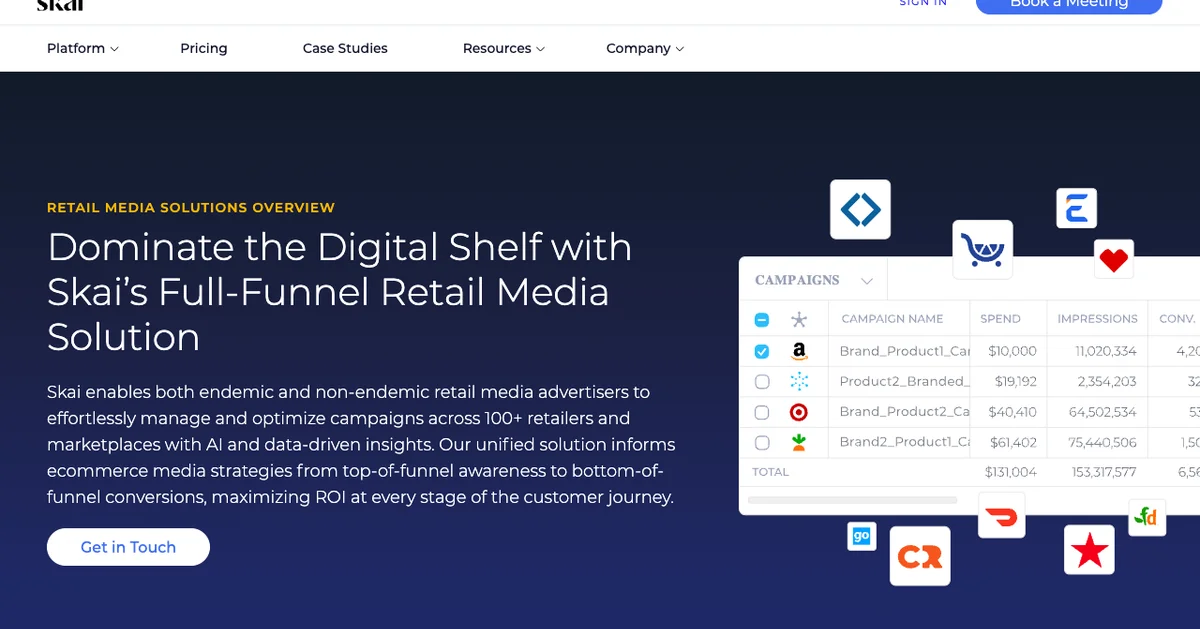
Skai is emerging as a contender in the retail media technology space, offering a platform for both endemic and non-endemic advertisers. Skai focuses on streamlining campaign management across over 100 retailers and marketplaces, using data-driven insights and AI-powered optimization to enhance the advertising experience.
One of Skai’s standout features is its ability to provide a full-funnel retail media solution. Advertisers can engage customers at every stage, from awareness to conversion. Unlike other platforms, Skai brings everything under one roof, reducing the hassle of multiple logins and fragmented systems. This approach simplifies workflows and improves accuracy in attribution.
Another key aspect of Skai’s offering is its AI-driven tools. Features like automated bid and budget optimizations allow businesses to align their campaigns with specific goals. The Search Term Analysis tool quickly identifies inefficiencies in keyword targeting, ensuring resources are spent effectively. This level of detail can be a game-changer for advertisers looking to better their return on investment.
Skai’s dashboard is also noteworthy—users can create custom metrics and reporting layouts, making it easier to visualize data in a way that fits their needs. This flexibility allows teams to adapt their strategies based on actionable insights, empowering them to make informed decisions.
Skai’s features, AI capabilities, and focus on unifying retail media efforts make it a strong alternative to Kevel.
Pros
-
Unified platform for managing all campaigns
-
AI-driven optimization tools enhance efficiency
-
Custom metrics and reporting tailored to needs
-
Streamlined workflows reduce complexity
-
Full-funnel solutions for better customer engagement
Cons
-
Might require a learning curve for new users
-
The vast number of features could be overwhelming
-
Pricing may not be suitable for smaller businesses
Pacvue
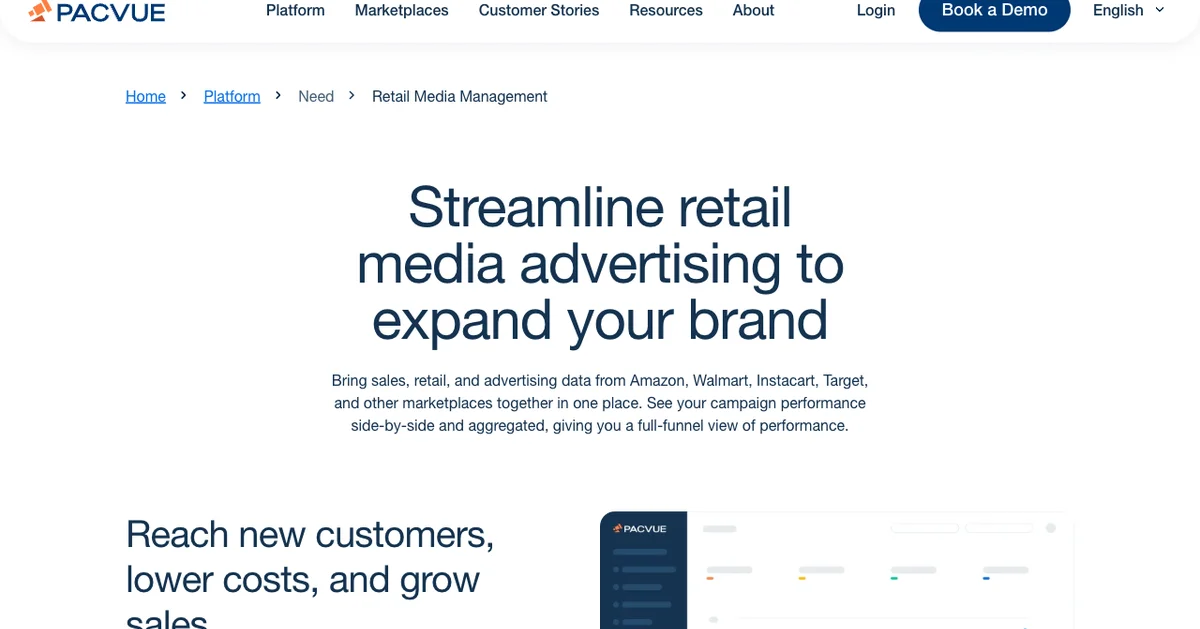
Pacvue is a player in the retail media technology space, offering a platform with a holistic approach to campaign management. Their iROAS Dashboard, part of the Incrementality Console, highlights retail media incrementality, helping brands gauge their ad performance. By bringing together sales, retail, and advertising data from major marketplaces like Amazon, Walmart, and Target, Pacvue provides users with a view of their campaign effectiveness. This is crucial for brands looking to streamline their advertising efforts and better returns.
One of Pacvue’s features is dayparting. This allows brands to optimize their ad spending by adjusting bids based on the time of day. For instance, reducing bids during low-converting hours and increasing them during peak times can lead to better efficiency and increased conversions. This is not just about saving costs; it’s about aligning advertising efforts with actual consumer behavior, making every dollar spent work harder.
Their Share of Voice (SOV) tools enable brands to see how they stack up against competitors. By closely monitoring metrics like impressions, clicks, and sales, businesses can fine-tune their strategies to ensure they are effectively reaching their target audiences.
Pacvue’s focus on generating insights through customized reporting further differentiates it from other players. Brands can distill key performance indicators tailored to their needs, placing them in a better position to achieve their goals.
Pros
-
Holistic campaign management across multiple retailers
-
Advanced dayparting functionality for optimized ad spending
-
Comprehensive Share of Voice analysis against competitors
-
Actionable insights through customizable reporting
Cons
-
Learning curve for new users adjusting to the platform
-
Potentially higher investment required compared to basic solutions
Quotient
Quotient is a player in the retail media technology landscape, offering solutions designed to enhance advertising capabilities for retailers. Positioned as a partner for brands looking to improve marketing strategies, Quotient provides services that blend creative development with strategic media buying. This combination allows retailers to create personalized ad content that resonates with consumers across multiple channels.
One of Quotient’s standout features is its creative services team. They focus on creating effective ad designs and copy that align with brand guidelines. Quotient encourages experimentation with new platforms and creative formats, ensuring that campaigns remain fresh and engaging. Their approach includes custom influencer-led content and ongoing optimizations based on real-time performance data.
Quotient takes a comprehensive approach to media buying. They work directly with retailers to devise tailored media strategies, enhancing campaign effectiveness and offering full-service operations from strategy to execution. Their ability to monitor and adjust campaigns in-flight means that potential issues can be addressed promptly, maximizing return on investment.
Quotient excels in audience building. They use proprietary data and analytics to develop actionable audience segments for brands, which can be activated across diverse media channels. Their offerings provide insights into performance trends, allowing businesses to adapt their campaigns over time for better results.
Quotient brings a blend of creative and analytical capabilities to the retail media space, making it a notable alternative to alt_7.
Pros
-
Comprehensive creative strategy and development
-
Strong media buying capabilities with real-time optimizations
-
Focus on audience segmentation and data integration
Cons
-
Possible complexity in service offerings can overwhelm new users
-
Emphasis on data may require familiarity with analytics tools
-
Pricing might be higher for robust service packages
Epsilon
Epsilon is a name in retail media technology, known for connecting brands with consumers throughout their shopping journey. They create customized retail media networks, using consumer data. With relationships in retail, Epsilon guides brands on reaching their target audiences effectively.
Epsilon focuses on data-driven solutions, combining customer insights with analytics. This allows businesses to create personalized advertising experiences that resonate with shoppers. While alt_7 may offer a platform, Epsilon’s strength is tailoring campaigns to consumer behavior and preferences.
Epsilon has a reputation for transparency and ROI accountability. Businesses appreciate tracking campaign success in real time, ensuring every marketing dollar is well spent. Their user-friendly dashboard simplifies campaign management, making it easy for brands to adjust strategies as needed.
Epsilon’s story isn’t just about technology; it’s also about fostering relationships. They collaborate with retailers to design media strategies that are mutually beneficial, increasing both brand visibility and retail engagement. This positions Epsilon as a partner, not just a service provider.
Epsilon stands out in retail media technology for its data-driven insights, personalized advertising, and strong partnerships. This approach can be an alternative to alt_7, especially for brands looking for a tailored touch in their marketing efforts.
Pros
-
Data-driven insights for targeted campaigns
-
Emphasis on personalization
-
Real-time tracking for campaign effectiveness
-
Collaborative approach with retailers
Cons
-
May require time to set up and integrate
-
Can be resource-intensive for smaller brands
-
Pricing may not be as competitive as some alternatives